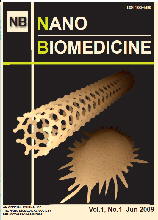Synopsis
Carbon nanotubes (CNTs) have the unique characteristics such as cell proliferation, extension of filopodium and enhancement of alkaline phosphatase activity to osteoblast-like cells. Proteins play important roles for cell proliferation and differentiation. In this study, adsorption of proteins was investigated by liquid chromatography using CNTs with different purification treatments to clarify the relation of proteins and CNTs. Two different sorts of CNTs were used, bold straight shape with high purity, and fine curled shape with low purity. The former CNTs showed rather weak adsorption. With processing of purification treatments adsorption ability was increased. Electrophoresis, protein sequence and mass spectrum indicated that proteins with a lower molecular weight had the tendency to be more strongly adsorbed. On the other hand, the latter CNTs showed strong adsorption regardless pretreatments.
Key words: carbon nanotube, biomedical application, protein adsorption, chromatography, electrophoresis
